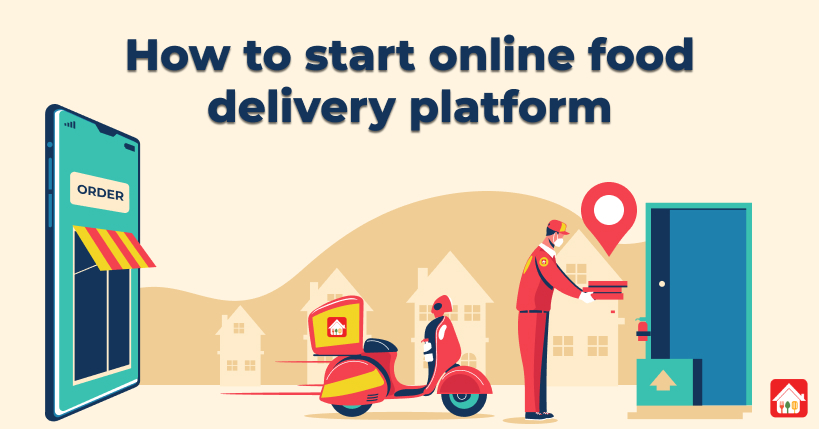Table of Contents
The business strategy outlined below can assist food entrepreneurs in launching an online homemade food selling app. Homemade food services reach a wider audience by allowing customers to buy meals and personalise their orders based on pricing, promotions, location, reviews, and other factors. Users can also keep track of the status of their orders and stay informed because of the home food selling app.
Customers have the option and convenience of ordering meals with only a few clicks on their smartphones thanks to the online food delivery platform. Previously, restaurants were responsible for delivering their own home delivery food, but this has changed dramatically in recent years.
Homemade food online can use both digital and conventional marketing channels with the help of home made food service. Customers may peruse the menus of their favourite restaurants with ease using an online home foodie app.
There are a few home made meals delivered that promise to deliver nutritious and delicious meals straight to your door. It’s no wonder that this business concept has gained popularity swiftly.
Food Next Door (FND) conducted a thorough examination of several mobile apps and websites used in the online homemade food delivery. Entrepreneurs interested in starting a home cooked food delivery app can use an existing platform or engage developers to create a customized platform. To further understand market dynamics, let’s look at the business and revenue models of various online meal delivery companies.
Online Food Delivery Platform Business Model
An online food delivery marketplace connects home baker, home made dishes, delivery agencies, app for home cooked food and those who want meals delivered to their door.
With mobile phones becoming an increasingly significant part of our daily lives, the online food ordering and delivery industry have noticed that the vast majority of customers prefer to buy food through mobile apps. Along with the online platform, your food home to home food delivery system should incorporate mobile apps for admins, merchants, delivery employees, and customers. Any online meal delivery system’s typical business model can be explained by considering the platform’s four primary entities: admin, restaurant owners or merchants, delivery agents, and customers. The following are some of their primary responsibilities:
The Administrator
The product belongs entirely to the administrator. The admin can easily control the UI of the food delivery website and keep track of numerous actions such as placed orders, deliveries, newly registered users, and customer reviews using the admin panel or dashboard. The platform owner can manage several verticals of the marketplace from his or her mobile phone using the food delivery mobile app for admin, making management easier.
Merchants
Merchants create an account on the platform and fill out detailed information about their business and services. After the admin approves the account, it is created. Depending on the subscription plan they choose, retailers can register a single restaurant or numerous restaurants. Restaurant proprietors can also use a merchant app to run their business. Restaurant operators can use the merchant dashboard to manage and edit menus, accept or reject orders, create offers and discounts for consumers, and measure sales and profit.
Delivery Agents
Delivery Agents Delivery agents can create accounts on the food delivery platform by visiting the website or downloading the mobile app. The admin or the restaurant can manage the order delivery. On the delivery staff app, once the order is accepted, it is broadcast to the delivery agents who are present near the restaurant location. Depending on their availability, the delivery agents can accept or refuse the order. If no delivery agent accepts the order, the admin can assign the order to a certain delivery crew member.
Consumers
Consumers can either make an account on the food delivery marketplace or utilise the food delivery website or customer app to place orders as guest users. Customers can choose from a variety of eateries that deliver to their location to place an order. Customers can place orders with a few clicks on their mobile phones after selecting the food items they want to get.
One of the main goals of any new platform aimed at a specialised market is to educate its new customers on how to utilise it. This is why your food ordering and delivery portal should have a section that instructs customers on how to do various tasks in the marketplace.
The food-delivery sector has exploded in popularity in recent years. People prefer to purchase food online rather than go to a restaurant. As a result, there is a high demand for online meal delivery, which has led to the creation of food platforms. Despite the fact that numerous businesses have emerged in various areas, the majority of them are achieving good progress. This is because this niche is based on proximity, making it simple for a new business to profit from an underserved market.
If you want to build your online food delivery business quickly, your solution should have unique features and functionalities. This would undoubtedly assist you in catching the majority of the market.
Benefits of Using Food Delivery Platform
The meal delivery business model provides a win-win situation for everyone involved, including restaurants, app users, and delivery personnel.
- Customer care is available to users 24 hours a day, 7 days a week.
- Customers can save time and money by browsing menus from a variety of eateries and placing orders online.
- The status of the ordered food can be tracked by customers.
- Tracking the status of your order is an option.
- The user can find their favourite restaurant depending on its location, special offers, ratings, and cuisines.
It is challenging for home chefs to develop a tech-based solution or website to start their own home food delivery business.
We at Food Next Door (FND) have created a platform where we envision empowering all home chefs to start their own home food delivery business without investing or worrying about logistics.

